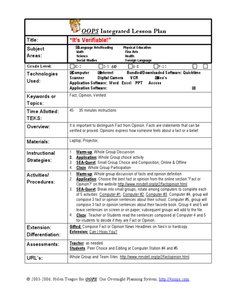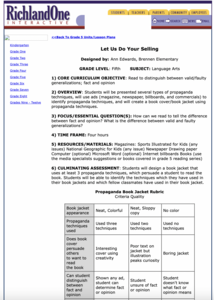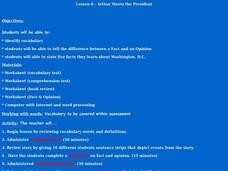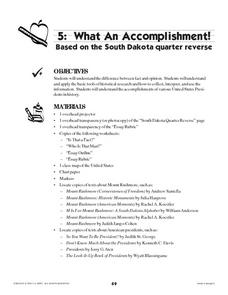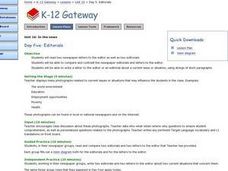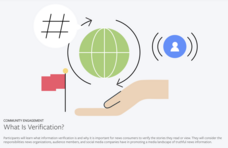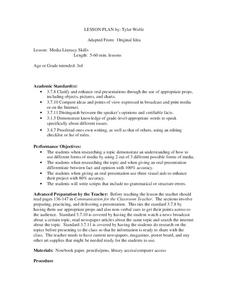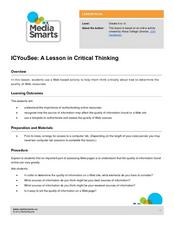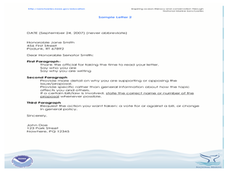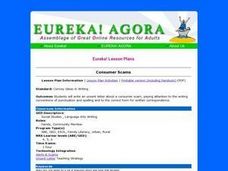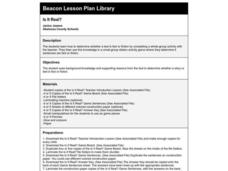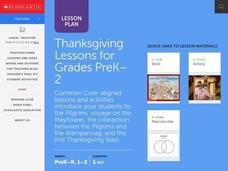Curated OER
"It's Verifiable!"
Students examine the differences between fact and opinion. They define fact and opinion, evaluate their favorite fact or opinion on a website, and in small groups write sentences using facts and opinions about school and their favorite...
Curated OER
Let Us Do Your Selling
Sixth graders analyze several types of propaganda techniques and create a book cover using the techniques. In this propaganda techniques activity, 6th graders analyze the propaganda techniques used in various ads. Students analyze the...
Curated OER
Arthur Meets the President
Students read, Arthur Meets the President, and review the story using sentence strips and complete a book review activity with a partner. In this reading skills lesson plan, students work on fact and opinion and...
Curated OER
What an Accomplishment
Students identify and discuss the images on the back of the South Dakota quarter. They discuss the differences between facts and opinions, and research information about the four presidents memorialized on Mount Rushmore.
Curated OER
Editorials
Students investigate editorials. In this literacy critical thinking lesson, students compare and contrast two newspaper editorials and two letters to the editor by completing a Venn diagram. Students work in groups to write...
Facebook
What Is Verification?
One of the most important skills news consumers and social media users must develop is the ability to determine the veracity of stories they read or view. Here's an interactive lesson plan that teaches high schoolers how to verify news...
Curated OER
Pioneering Children on the Move
Students inquire about life for pioneer children. In this pioneer period lesson, students analyze photographs of children, make information foldables, and create a covered wagon that was typical of the ones of the past. Students will...
Curated OER
Equal Protection of the Law: Fact or Fiction
High schoolers focus on the 14th Amendment of the Bill of Rights to decide whether or not racism denies citizens of their rights under the amendment. They watch a movie, Every Two Seconds and complete a worksheet (included in the plan)...
Roy Rosenzweig Center for History and New Media
Analyzing Political Campaign Commercials
Imagine a lesson that models for learners how to separate facts from opinions. How to detect bias. How to evaluate a source of information. How to identify propaganda. Although designed for middle schoolers, the activities in this packet...
Curated OER
Editorials- Facts that Support Opinions
Fourth graders complete a worksheet. In this author's opinion lesson, 4th graders read editorials and determine how the use of facts supports the author's opinion. Students complete a facts to support opinions chart.
Curated OER
Reading And Responding: Lesson 15 Nonfiction
Eighth graders examine a nonfiction selection in a teacher led lesson plan. They examine the author's purpose for writing the selection and identify the difference between fact and opinion. The compare and contrast expository and...
Curated OER
Media Literacy Skills
You're on camera! Third graders find a news story and research it to get more information. Everyone uses their found information to write a script and create their own news broadcast!
US House of Representatives
Black Americans in Congress Speak Their Mind
To conclude their study of Black Americans in Congress, groups select a statement made by one of the Members, examine the Member's profile on the provided link, and create a display that includes state represented, years of service, an...
Curated OER
ICYouSee: A Lesson in Critical Thinking
Stress the importance of authenticating online resources and understanding the sources of websites' information with this activity. Using a Web-based activity, the lesson prompts young learners to think critically about determining the...
Newseum
Bias Through History: Analyzing Historical Sources
Young journalists use the E.S.C.A.P.E. (evidence, source, context, audience, purpose, and execution) strategy to evaluate historical and contemporary examples of bias in the news. The class then uses the provided discussion questions to...
Curated OER
Identifying Facts and Forming Opinions
Kirsten Hall's animal books provide learners with an opportunity to practice forming statements of opinions and factual statements. Using sentence starters such as "I learned. . ." and "I think. . ." class members craft sentences cite a...
Curated OER
BUS: Farming: It's A Fact (Ag)
Students create two different types of graphs from the information in the "Farm Facts" booklet (i.e., bar graph, pie chart, etc.). They calculate where your food dollars are spent (on and off farm).
Curated OER
Identifying Opinions with Signal Words
First graders identify opinions within a text. In this language arts lesson plan, 1st graders discuss the definition of opinion. Students identify words that signal opinions and work together to identify opinions within the text.
Curated OER
Fact versus Opinion
Eleventh graders distinguish between fact and fiction in a one day selection of the Official Proceedings of the Alabama 1901 Constitution
Curated OER
In My Opinion
Young writers craft letters to the government stating their opinion on different topics. They pick an environmental or ocean issue, research it, and craft their formal persuasive letter. Ensure your learners include supporting facts and...
Curated OER
Convey Ideas in Writing
Use the platforms of the 2004 presidential candidates to bring persuasive writing to your class. Young voters identify the three issues most important to them in the election and research the issues and candidates' positions. They write...
Newseum
Fake News Through History: Analyzing Historical Sources
Unfortunately, fake news, fuzzy facts, and bogus news stories are not new phenomena. Class members use a "Fake News Through History" worksheet to analyze historical examples of false, invented, made-up news. Researchers share their...
Curated OER
Is It Real?
First graders see how to determine whether a text is fact or fiction by completing a whole-group activity with the teacher. They use this knowledge in a small-group station activity game where they determine if sentences are fact or...
Scholastic
Thanksgiving Lessons Grades PreK-2
A quintessential resource for teaching an elementary unit on the first Thanksgiving addresses a variety of skills, including informational reading, critical thinking, comparing and contrasting facts, technology tools, and historical...
